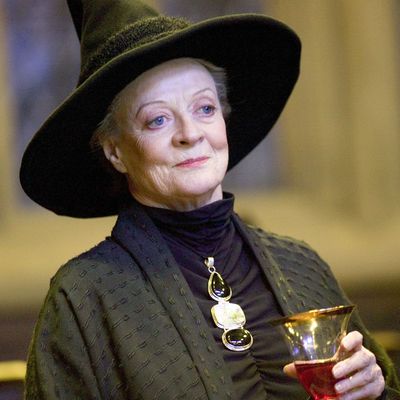
This is not a magic trick: It’s been 20 years since we all met the boy who lived. In September 1998, Harry Potter and the Sorcerer’s Stone was released in the U.S., and though but mere muggles, we were welcomed into J.K. Rowling’s Wizarding World. Along the way, we came to know not just Harry Potter, but the people around him — friends, foes, goblins — but let’s be real: in the discussion of Potter characters since, some get a lot more love than others. I mean, Dumbledore? Yeah, he’s wise, mysterious, makes questionable choices regarding the safety of his students, has a relatable sweet tooth, and basically invented beards. We get it, he’s a great character. Severus Snape? Possibly one of the most complicated and tragic figures in literature. But here, on this milestone anniversary, it’s time we make room for someone else. Someone who spent much of her life as the best friend and No. 2 to an unknowable man. Someone who is at once stern and caring, strict and kind. Someone who suffers no fools and breaks rules in the name of Quidditch. Someone who can produce three patronuses at once, people. It’s time to celebrate the baddest witch around — tartan loving, top-knot-rocking Minerva McGonagall.
Typically, the best place to start when trying to understand any Harry Potter supporting character is with the name. Minerva is the Roman goddess of wisdom and strategic warfare — that totally tracks. McGonagall is not only professor of Transfiguration, which, she’ll have you know, is “some of the most complex and dangerous magic” out there, she believes in studying hard and achieving greatness, and she really dislikes Gilderoy Lockhart. So yeah, she’s wise. As for the warfare bit: It is McGonagall who leads the front in the Battle of Hogwarts; Harry may be the only one who can defeat Voldemort, but it is McGonagall who makes plans and prepares Hogwarts for war while Harry’s off conversing with ghosts about tiaras. Team Hogwarts suffers serious losses, but it would’ve been much worse without McGonagall at the helm, putting Slytherin in its place (“We duel to kill,” she tells head of Slytherin house Slughorn) and summoning “Piertotum Locomotor” to rouse all the Hogwarts statues. Seriously, read the line “[…] do your duty to your school” and try not to get goosebumps. It’s on page 602 of Harry Potter and the Deathly Hallows. I’ll wait.
There’s our Minerva, a pillar of strength, a woman of great intellect, someone who does not mess around. Plus, she wears emerald green even though she’s head of Gryffindor because dammit, the witch knows what she looks good in.
But Rowling gives our beloved Transfiguration teacher the last name McGonagall for a reason, and taking her whole character into consideration, it makes a lot of sense. In the McGonagall biography Rowling wrote for the Pottermore site, she explains that McGonagall is named after William McGonagall, widely agreed upon as the worst poet in English history. “There was something irresistible to me about his name,” she writes, “and the idea that such a brilliant woman might be a distant relative of the buffoonish McGonagall.” Now, our McGonagall is no one to be laughed at, but the idea of a goddess of war and a buffoon as the meaning behind her two names is so paradoxical; doesn’t that perfectly describe the Minerva McGonagall we know?
She’s constantly described as severe-looking and stern. When Harry meets her at Hogwarts, his “first thought was that this was not someone to cross,” and even Rowling’s descriptions of McGonagall’s speech patterns evoke a certain strictness: it’s always “she said, crisply” or that her voice “cracked like a whip.” And yes, McGonagall is indeed a tough broad who instills fear (you just know she likes it that way), as evidenced above, but she isn’t unfeeling or cold. In that way, she’s much the photo negative of Dolores Umbridge who speaks in a cutesy manner and wears a friendly shade of pink, but is actually evil to the core. McGonagall is an example of a woman who is strong-willed, principled, has no patience for idiocracy and is still kind and emotional. Cripes, the lady is repeatedly on the verge of tears throughout the series — when she learns of James and Lily’s deaths, when she finds Harry in Moody’s office after Cedric’s death, and, of course, the most haunting emotional outburst: when she sees Hagrid carrying Harry’s lifeless body in Deathly Hallows and is the first to scream out. This sentence will never leave my brain: “The scream was more terrible because [Harry] had never expected or dreamed that Professor McGonagall could make such a sound.” Somebody hold me.
Of course, the genius of Rowling’s writing, like so many other elements of the series, is that these typically opposing characteristics that exist within McGonagall are there, in plain sight, the very first time we meet her. Oh, and if you don’t think McGonagall is an important fixture in Harry’s life, consider that she is there at the beginning of his story, when he arrives at Number 4 Privet Drive, and the end of his story at the Battle of Hogwarts.
In the very first chapter of the first book, we meet a strange tabby cat with markings around its eyes who soon transforms into Minerva McGonagall —she represents the first bit of magic Rowling gives us. And in that one scene, as Dumbledore explains to her and Hagrid why they must leave Harry with his muggle aunt and uncle, McGonagall goes from reprimanding all of the Wizarding World for partying too hard, to crying over James, Lily, and little Harry, to admonishing Hagrid for blubbering too loudly while still comforting him, to opposing Dumbledore’s plan to give Harry to the Dursleys because it just feels wrong. It’s a wonderful representation of the character and a preview of how McGonagall will function throughout the series.
Maybe it’s because she’s with Harry at the beginning of everything that she remains attached to him. Her loyalty to Harry is her most endearing quality (her sharp humor is a close second). She’s never easy on him, but you know she cares deeply. When his name mysteriously comes out of the Goblet of Fire in book four, she’s the one who sticks up for him. In Order of the Phoenix, when he wakes from a nightmare about Arthur Weasley being attacked by Voldemort and knows it’s not just a dream, she’s the one who says, “I believe you, Potter.”
In a series seemingly littered with father figures and male mentors for Harry, it’s important to remember the strong women in his life. Hermione is a feminist icon, no big deal; Book Ginny is his perfect match; Molly Weasley represents everything Harry imagines a mother should be. But there’s something extra-special about what Minerva McGonagall represents. She’s nurturing in a non-maternal way. She’s tough, but never cruel. She’s a fucking legend, and deserves to be celebrated as such. And if she ever read this, she would most definitely say to me, “Oh, get a grip on yourself.”


